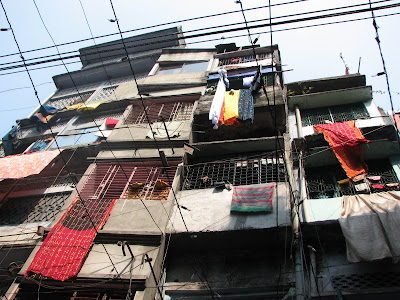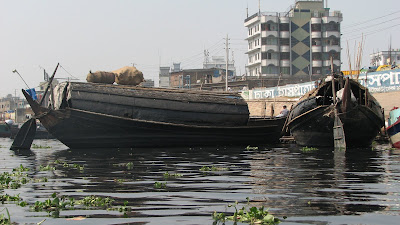I ventured in to Old Dhaka. The city changed drastically as we moved deeper into the chaos. I had been told by a couple people before I left the comforts of Baridhara (the swanky neighborhood I'm staying in) that muggings and bag snatchings are common. In the rickshaw I started to panic and I shoved everything into my knee socks including money, passport and memory cards. I clutched my bag tight and wondered how I would be able to take photos if it's actually as dangerous as I'm told.
By the time I got to Hindu Street in the heart of Old Dhaka I started to loosen up. People talked to me on the street and were incredibly friendly. A festival for Pooja was going on so there were floats of the diety and music. Hindu Street is a lively, pedestrian street where artisans make bracelets out of conch shells right in front of the shops. The street was narrow and the buildings on either side were 3 or 4 stories each in different stages of decay or construction, each very lived in with fabrics and colored lights hanging from the windows and balconies. The energy on the street was positive and I felt encouraged to take out my camera.
I started off toward the river Buriganga. I'll never forget this moment. The area was bustling, small and large boats of cargo and people transferring, moving like a colony of ants. I started across a foot bridge to get a better view from outside the chaos and I saw that I could get a boat nearby. I walked back the way I came and was stopped by a man in a red blazer who wanted to chat about my thoughts on Bangladesh for a minute through some simple English words. Then I said "I want to take a boat ride on a small boat," accentuated by my own sign language. He very calmly nodded. Others had gathered around trying out their 2 or 3 words of English. He put up a hand to keep them quiet and we walked. I stepped off the pavement into a massive pile of garbage. He led me down to the bank of the river where shanties of blue plastic and corregated metal had been built along the foot bridge. The ground was completely covered in garbage. A couple of people had laid out a blanket on the garbage and were sleeping. The stench was horrible, like urine and rotten food. And I had attracted a crowd. The man tried to find me a boat by shouting and gesturing to some idle boats nearby. The first two were too large and I sent them away trying to tell him I didn't want a motor, just a rower. Finally he found a proper wooden boat and negotiated a price of 150 taka (about $2) for an hour on the water. We took off.
The black wooden boat was long, pointed and tipped up at the ends, wide in the middle- a graceful design, like a paper moon. I sat on the floor on a bamboo mat. The driver used a long bamboo pole to push us along the shallow river.
I don't know what I was expecting riverine life to be like, but it was not nearly as picturesque or remotely glamorous as the guidebook, National Geographic or any other western publication made it out to be. It was nauseating. The smell of sewage was so strong I nearly gagged. The water was black like an oil slick and sometimes I saw the rainbow mirror of oil floating on top. Plastic garbage and a kind of lily pad co-mingled on the surface. On the banks people washed their bodies and brushed their teeth, scrubbed clothes and sheets. One stretch was devoted to plastic bag washing where women cleaned the bags, shook them out and found new spots to dry in the sun, along with thousands more. Plastic bags are rare in Bangladesh and there are some laws against using them. One must carry a cloth shopping bag. For small items and street food, bags are made from old newspaper, folded and stapled.
I gave the boat driver our agreed upon payment and he insisted on baksheesh. I had read in Indian novels about baksheesh- it translates as tip, but it's most commonly used as a soft term for bribe, usually to the police. I gave him an extra 20 taka and trudged through the garbage up to the street.
Parallel to the river was an import market for fruits. Boxes of apples individually wrapped in a plastic foam mesh came from China, grapes and oranges from Pakistan and Egypt. It was disappointing to see. The land here is incredibly fertile- minerals and nutrients all the way from the Himalayas continue to be deposited through sedimentation into the soil from the 230 rivers and tributaries that flow across the nation. This rich land of Bangladesh has been built up over millenia. And yet almost all of the cropland is monoculture, for rice and jute- a cash crop.
Since I was sightseeing as I explored the streets I asked some cops how to get to Sitara Mosque. About 20 people crowded around to listen in. After about 5 minutes of looking at my map, everyone giving their opinion and lots of good healthy shouting to make sure I got the pronunciation right, they got me on a bicycle rickshaw, negotiated a price of 20 taka for me and sent me away.
We rode through the streets until down one incredibly narrow road we stopped. A traffic line of bicycle rickshaws was completely stopped. I offered to walk 3 times but the driver wouldn't let me off. After 10 minutes of sitting I insisted and got off, paid him and walked to see what the hold up was. At the end of the block was an intersection so jammed with bicycles and wooden carts that I had to
climb over to get to the other side. It was truly hilarious. A cop was standing up on someone's cart in the middle of the madness shouting and pointing with his bamboo lathi (night stick) trying to untangle the knot of people powered vehicles.
While asking for directions I met a man named Ali who spoke some English. We chatted and he offered to take me to his mosque nearby. The 3-domed building was covered in broken glass mosaic in white and primary colors. The walls were open on two sides. Half of the mosque was a school for children and on the other side men were praying on floor mats. Ali explained to me that women were not allowed in but after a few minutes of talking to the other men, they reluctantly let me in and unlocked a gate to the most decorated area. They were proud of their mosque and encouraged me to take photos. But when my scarf slipped off my head the men came running to tell me I must keep my head covered.
Ali and I walked to his home and asked me to come meet his family. We ducked in through a 4 foot tall metal door off the street into a narrow courtyard opening to a slightly wider space at the end. On the left was his home, one room, about 9' x 12' with a queen size bed for himself, his wife and 14 year old daughter. One wall was a mural of a Bangladeshi countryside, the others were teal green. I surveyed the room, intrigued by the few articles of possession giving clues into his life and values. There was a metal wardrobe cabinet with clothes, purses, bangles and shoes, a small green refrigerator, some tea cups, dishes and a few instruments for cooking; on the wall were many postcards, a framed photo of the Taj Mahal and two calendars from a cell phone company. He must have noticed me looking around and said a little too loudly "I'm a very poor man!" I said, "No, this is a wonderful home." and he pulled out a photo album and asked me to sit on a wooden folding chair. He had photos of every one of his daughter's 14 birthdays and of family trips to an amusement park, Chittagong, Taj Mahal and Qatar. He brought his wife and daughter in and I took a photo of them in the house.
The courtyard between several homes was shared by the extended family. Ali's mother, three sisters, their husbands and children lived in the makeshift complex. Each family had a one room home that opened to the courtyard and had no windows otherwise. Cooking and washing was performed in the courtyard and there was one toilet at the end of the narrow space for all. I took photos of the children and families and promised to mail them. They offered me rice and dal and I almost accepted, but I wanted to get home before dark.
Ali and I walked to the main road and I bought us some sweet dumplings made of rice flour, filled with coconut, sugar and milk. He had spent over an hour with me and had brought me to several places, including an Armenian church which he had to ask around on the street to find someone with a key to let us in the gate. I thought I should offer him some baksheesh for his time, but I also knew that if he expected it, he would ask for it, as people do here and in India. He found me a rickshaw and worked on a good price for me and sent me off with just a tilt of his head and a smile. It was such a good day.























